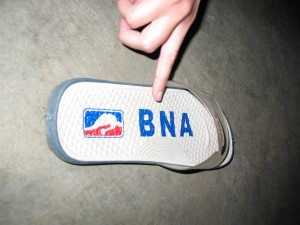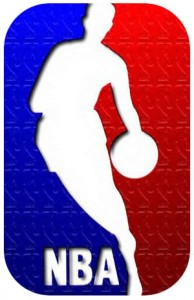Basketball National Association
« previous post | next post »
The following picture was taken by my student, Ori Tavor, in the summer of 2007 in a little Tibetan village near Daqin, Sichuan.
Since it's the BNA that's being touted here, perhaps the NBA won't go after the Chinese manufacturer for copyright infringement, except that the logo is identical to that of the NBA:
The least they could have done is change the colors or modify the shape somewhat, or maybe put a football in the guy's hand!
Seriously, though, I think that this is the work of a dyslexic plagiarist. (I just did a Google search for "dyslexic plagiarist" and was surprised to learn that there is only one other instance of its use — applied to Albert Einstein.)


Sky Onosson said,
April 7, 2009 @ 10:58 pm
I remember a clothing store in the little town in S. Korea I lived in. It was called CNN, complete with appropriate corporate logo.
Liberty said,
April 7, 2009 @ 11:33 pm
I've always wondered about this phenomenon in China… I once saw a child's backpack with a picture of the Flintstones on it, which was labeled "The Peanuts." Pretty much the entire country seemed to be blanketed in merchandise emblazoned with the logo "Chicago Bluls" when Michael Jordan still played for the Bulls. An effort to avoid copyright infringement or scribal error?
In the text on pirated goods, one frequently finds letters (or numbers) substituted for similar-looking letters, i.e., 'B' , 'R', and '8' are sometimes mixed up, as are 'O' and 'D,' as well as 'C' and 'G', and '3' and 'E.' Although these could be errors generated through low quality OCR software, I think these are scribal errors when the counterfeiters don't know English.
I've asked Chinese about this, and they've said that the counterfeiters just aim for the symbolic status of English on the merchandise, and that the errors aren't really important because most Chinese don't read English. Given the huge numbers of Chinese who now speak or study English, I wonder if this might be changing.
Actually, I find it quite convenient that counterfeited goods have these kinds of errors on them, as can quickly identify counterfeited medicines, etc., if one knows English.
Bokai said,
April 7, 2009 @ 11:52 pm
This sort of bootleg is extremely common in Asia. I took a picture of something similar back when I was in Taiwan. It's a KFC knockoff, complete with familiar red bucket (Although the mascot has been altered slightly.)
Behold, KLG:
http://www.flickr.com/photos/bookies/37209399/
Benjamin Lukoff said,
April 7, 2009 @ 11:52 pm
I've noticed this sort of syntax in the U.S. more and more over the last few years. Stuff like "Apple Hot Deals" instead of "Hot Apple Deals." Anyone know what is going on here?
C. Thomas said,
April 8, 2009 @ 12:27 am
It might be valid that the visual effect is more important than the language surrounding it – certainly in the case of the NBA emblem and the KFC bucket, the approximation of the images on the product are more significant than the letters used.
I would bet that this is intentional, as this happens in US bootlegs as well. Most designer product knockoffs are only made for the visual style – the distinctive factor is that they are missing an authentic tagging. Designer handbags, for instance, are common candidates for replication. The people making them just know a little better to avoid the lettering for the US buyer.
Rick said,
April 8, 2009 @ 2:38 am
There was a "Pizza Hat" restaurant in Adana, Turkey, again w/ the correct logo.
Nathan Myers said,
April 8, 2009 @ 2:50 am
Throughout southeast Asia I noticed similar oddities in all English displays, not just places where trademark avoidance might be a motivation. I concluded that it was deliberate to make some obvious mistake on the first version of any graphic production. If the customer cares to get it right, they have to pay, again, for the correction. Not caring is cheaper.
peter said,
April 8, 2009 @ 4:06 am
Reminds me of that old joke asking: What do the letters "D. N. A." stand for? Answer: "National Association of Dyslexia".
aabram said,
April 8, 2009 @ 5:22 am
Pretty sure this one is intentional too, as many others. Good many years ago we had Adibas sportswear which supposedly originated in Poland, not Asia. Also Cucci, Redbok, Nice and others. It definitely was intentional, not accidental. I am no expert in intellectual property matters, but I do remember that these were supposed to be to avoid accusations of selling counterfeit goods. Not sure how much water that holds though.
hsgudnason said,
April 8, 2009 @ 6:06 am
Isn't this somewhat similar to the Max Planck Institute journal's cover with the ad in Chinese for prostitutes? "Hey! It looks Western/Chinese! Let's use it!"
Tim Silverman said,
April 8, 2009 @ 7:11 am
IANAL, but I believe that under English law, at least, it's trademark infringement if a reasonable person could accidentally mistake the knockoff for the real thing. (This also applies to unintentional trademark infringement cases, where two products have ended up with the same name. If the products themselves are different enough—coffee and hammers, say—that fact is a defence against trademark infringement claims precisely because, no matter how similar the names or even logos, no reasonable person is likely to mistake coffee for hammers or vice versa.) [Disclaimer: I'm not a lawyer and this is not legal advice!]
Sparadokos said,
April 8, 2009 @ 11:24 am
I remember seeing products like this when I first visited Russia, in 1996: Neki for Nike, Adibas for Adidas (as aabram mentions), etc. I assumed it was a way to 1) get around copyright infringement, while 2) luring unsuspecting consumers into buying what they think are authentic name brands.
Cameron said,
April 8, 2009 @ 11:48 am
I think I mentioned this in a comment to another post some time back. But my favorite pirated product name from the third world was the "Wrigglers Gum" that you could buy in Iran in the 70s. For all I know it may still be available.
Karl Weber said,
April 8, 2009 @ 6:58 pm
I bet there are some comparable errors in the "Chinese" characters worn by some NBA players in the form of tattoos . . .
Canuck said,
April 9, 2009 @ 6:27 am
I saw a great example on a t-shirt when I was in Spain back about 20 years ago. Of course the t-shirt could have been from Asia. It showed an American Football quarterback in the archtypical quarterback pose: throwing arm back, other arm curved in front, looking for a pass receiver. It was complete with stats in small letters and underneath, in big red-white-and-blue letters it said: American Baseball.
Kenny Easwaran said,
April 9, 2009 @ 2:07 pm
In Australia I saw many people wearing shirts with the names of fake American sports teams on them. My favorite were the Ohio State University Vikings and the Boston Red Wings. (The latter was a polo shirt, so I couldn't tell if it was intended to represent a hockey or baseball team – not that Australians tend to play either sport very much.) I was very confused about a fake vintage shirt that said something about "Lake Ciox 1983" or something similar, until my boyfriend suggested that "Ciox" might not look any weirder than "Sioux" to an Australian.
Merri said,
April 10, 2009 @ 10:07 am
It happens in the USA too. See e.g.Miskatonic University polos. Usually, if asked about it, those wearing them have enough meat to put on their story to make it credible.
Jerry Hobbs said,
April 12, 2009 @ 6:14 pm
In Hong Kong in 1979 I saw someone wearing a sweatshirt that said, "ULCA". I just assumed it was from a batch someone had made a mistake on and thus couldn't sell in the US.
Adam K said,
April 19, 2009 @ 10:48 pm
In Karachi, Pakistan there is a huge building dedicated to pirating movies and DVDs called The Rainbow Centre. The pirated products that come out of these places often have spelling, grammar, and every other type of linguistic error you could imagine (I would be surprised if they even use one consistent language on one product). But when there is a mix-up with copying texts for a pirated DVD or other pirated item it is not because of fear of copyright infringement. If that was the case they would probably avoid avoiding include other very identifiable features of the film/TV series they are trying to replicate. Instead, most of the mistakes seem to stem from a poor understanding of English from many of those reproducing these films. They often are without a standard education and have little to no knowledge of English. And there is little incentive to actually get the spelling of many of the products correct. As long as you are able to vaguely identify the title of a movie, that is good enough. After all, everyone already knows it is pirated. Nobody is fooling nobody.